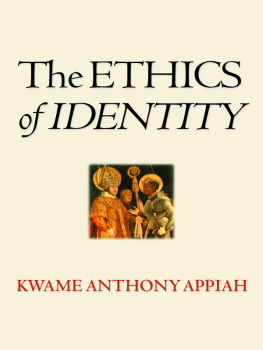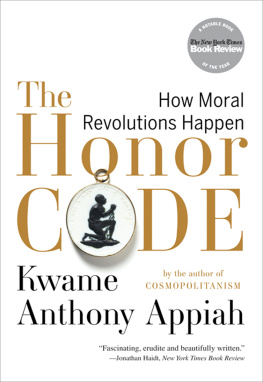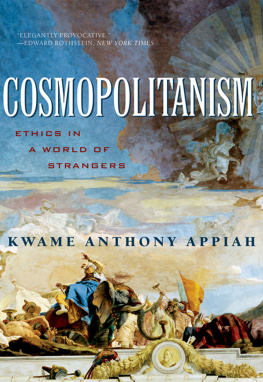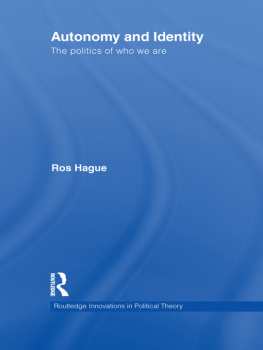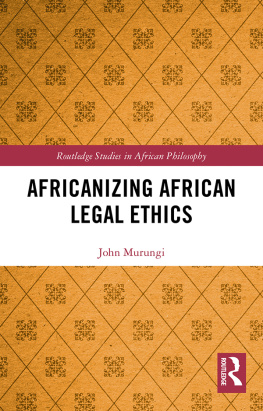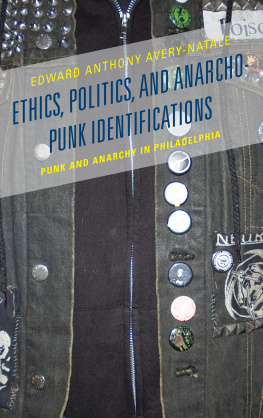Kwame Anthony Appiah - The Ethics of Identity
Here you can read online Kwame Anthony Appiah - The Ethics of Identity full text of the book (entire story) in english for free. Download pdf and epub, get meaning, cover and reviews about this ebook. City: Princeton;N.J, year: 2005;2013, publisher: Princeton University Press, genre: Science. Description of the work, (preface) as well as reviews are available. Best literature library LitArk.com created for fans of good reading and offers a wide selection of genres:
Romance novel
Science fiction
Adventure
Detective
Science
History
Home and family
Prose
Art
Politics
Computer
Non-fiction
Religion
Business
Children
Humor
Choose a favorite category and find really read worthwhile books. Enjoy immersion in the world of imagination, feel the emotions of the characters or learn something new for yourself, make an fascinating discovery.
- Book:The Ethics of Identity
- Author:
- Publisher:Princeton University Press
- Genre:
- Year:2005;2013
- City:Princeton;N.J
- Rating:4 / 5
- Favourites:Add to favourites
- Your mark:
- 80
- 1
- 2
- 3
- 4
- 5
The Ethics of Identity: summary, description and annotation
We offer to read an annotation, description, summary or preface (depends on what the author of the book "The Ethics of Identity" wrote himself). If you haven't found the necessary information about the book — write in the comments, we will try to find it.
The Ethics of Identity — read online for free the complete book (whole text) full work
Below is the text of the book, divided by pages. System saving the place of the last page read, allows you to conveniently read the book "The Ethics of Identity" online for free, without having to search again every time where you left off. Put a bookmark, and you can go to the page where you finished reading at any time.
Font size:
Interval:
Bookmark:

The ETHICS of IDENTITY
The ETHICS of IDENTITY
KWAME ANTHONY APPIAH
Copyright 2005 by Princeton University Press
Published by Princeton University Press, 41 William Street, Princeton, New Jersey 08540
In the United Kingdom: Princeton University Press, 3 Market Place, Woodstock, Oxfordshire OX20 1SY
All Rights Reserved
Eighth printing, and first paperback printing, 2007
Paperback ISBN-13: 978-0-691-13028-6
The Library of Congress has cataloged the cloth edition of this book as follows
Appiah, Anthony.
The ethics of identity / Kwame Anthony Appiah.
p. cm.
Includes bibliographical references and index.
ISBN 0-691-12036-6 (alk. paper)
1. Ethics. 2. Group identityMoral and ethical aspects. 3. Identity (Psychology)Moral and ethical aspects. I. Title.
BJ1031.A64 2005
170dc22 2004044535
British Library Cataloging-in-Publication Data is available
This book has been composed in Minion
Printed on acid-free paper.
press.princeton.edu
Printed in the United States of America
12 13 14 15 16 17 18 19 20
 For Henry Finder
For Henry Finder
totum muneris hoc tui est
HORACE, Odes 4.3
Contents

Preface

IN CONTEMPORARY philosophical discussion in the English-speaking world, there is a broad consensus on the outlines and the history of a liberal political tradition. It is conventional, for example, to suppose that this tradition owes much to Lockes conception of religious toleration and to his theory of property; that the language of human equality and human rights, which was developed in the French and American Revolutions, is central to the heritage; that it is natural for a liberal to speak of human dignity and to suppose that it is (ceteris, as usual, paribus) equally a possession of each human being. It is also regularly assumed that the tradition is ethically individualistin the sense that it assumes that, in the end, everything that matters morally, matters because of its impact on individualsso that if nations, or religious communities, or families matter, they matter because they make a difference to the people who compose them. We may have learned to think of these core elements of the liberal tradition as contested: so that, to put it crudely, liberals are not people who agree about the meaning of dignity, liberty, equality, individuality, toleration, and the rest, but are, rather, people who argue about their significance for political life. We may have learned, that is, that the liberal traditionlike all intellectual traditionsis not so much a body of doctrine as a set of debates. Still, it is widely agreed that there is such a tradition.
It is an interesting question whether we can, in fact, identify a tradition of thought that includes these elements; and it is, of course, a question that would require serious historical inquiry. My own suspicion is that if you began such an inquiry, the intellectual antecedents of Mill or Hobhouse or Berlin or Rawls would turn out to be more
So you might try to identify liberalism with traditions of practice, instead of thought. Taking a feet-first rather than headfirst approach, you could point to the development over the last few centuries, but especially since the American and French Revolutions, of a new form of political life. This form of life finds expression in certain political institutions: among them elected rather than hereditary rulers, and, more generally, some sort of appeal to the consent of the governed, but also limitations on the power of those who governeven in the name of a majorityexpressed in a legal system that respects certain fundamental rights. These civil or political rights carve out for citizens a corresponding sphere of freedoms, including freedom of political expression and freedom of religion. To be sure, each of these elements can come on its own: there were republics in Europe as far back as Athens; the first German emperors were elected; and freedom of the press and religious toleration developed in England within a monarchical scheme. What characterizes the beginnings of liberalism, then, would seem to be a combination of political institutions: constitutions, rights, elections, and safeguards for private property. In the twentieth century, across both Europe and North America, these things were supplemented by a public concern to guarantee certain minimum conditions of welfare for every citizen.
Still, talk of practice wont protect you from the perplexities of principle, and you wont get very far with the attempt to draw a line between the two. For theories of politics arent like theories of celestial mechanics: in the realm of the political, theories have a tendency to become a part of what they theorize. If there is a liberal form of life, it was always characterized not only by institutions but also by a rhetoric, a body of ideas and arguments. When the American colonists declared it to be self-evident that they had inalienable rights to life, liberty, and the pursuit of happiness, they sought to make it so. Its possible, though, that an emphasis on practices rather than principles can be helpful in showing just how heterogeneous those principles can be. For example, historians have debated the importance, for Americas Founders, of classical republicanismof a politics founded upon ideals of citizenship, rather than upon notions of individual rights. But once you accept that liberal democracy has been informed by talk of civic virtues as well as talk of rights, than you might well conclude that liberalism should be taken to subsume such putatively contending traditions. Not only does liberalism, taken in this loose and baggy sense, encompass nearly all members of nearly all of the mainstream political parties in Europe and North America; it also encompasses theorists who, in criticizing atomism or deontology, say, regard themselves as hostile to the liberal tradition rather than part of it. Letting liberalism absorb many of its ostensible rivals may invite charges of lexical imperialism. But it will at least forestall those grindingly familiar arguments about whether this or that putatively liberal position is or isnt really liberal. Such arguments are often illuminating in their substance, but not, I think, as arguments over a word.
So why ride that swaybacked steed, weighed down with its multifarious semantic baggage, in the first place? Thats a good question. I should admit Id once hoped to be able to write this book without recourse to it. That I didnt get very far is a reminder that all of our political terms are shopsoiled by history; to talk about autonomy or toleration or dignity is to join a conversation that has been ongoing long before you arrived and will continue long after youve departed. The problems Ill be exploring have arisen for those of us who find ourselves broadly convinced that certain values, now associated by anglophone philosophers with the word liberal, matter to the lives we lead, and to the politics we wish to fashion. At the same time, the problems I want to discuss are of significance whether or not liberalism is the right name for the project within which they arise. Indeed, I hope to persuade you that they are significant even if, mirabile dictu, you do not find yourself disposed to think of yourself as a liberal at all.

Font size:
Interval:
Bookmark:
Similar books «The Ethics of Identity»
Look at similar books to The Ethics of Identity. We have selected literature similar in name and meaning in the hope of providing readers with more options to find new, interesting, not yet read works.
Discussion, reviews of the book The Ethics of Identity and just readers' own opinions. Leave your comments, write what you think about the work, its meaning or the main characters. Specify what exactly you liked and what you didn't like, and why you think so.

